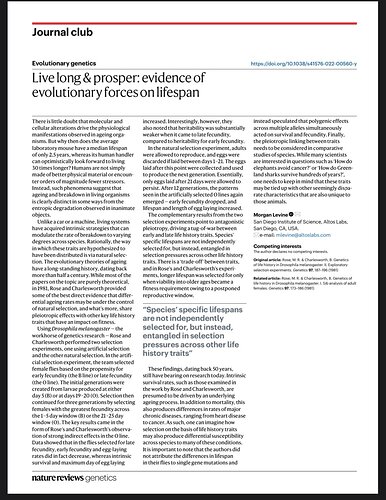I found the section of Morgan Levine’s presentation on the technical reliability of Epigenetic clocks and it is here:
What I would add to this is that we don’t know the technical reliability of the publicly available Epi clocks. If the maximum variation (from the video) is 9 years then it does make things a bit unusuable. Whether the statistical method she refers to can be used to reduce the variation or not I don’t know, but all we have (as individuals) is the raw data anyway.
The whole of the presentation is worth looking at/listening to.
4 Likes
When I did an epigenetic test, the result was off by 19 years! I doubt it was correct. 9 years off would be highly reliable in comparison.
The company did agree with me and has given me another test for free. I am awaiting the results!
1 Like
The 9 year figure was, however, from the same sample.
I know there are variations on biomarkers as at times I send a sample to two labs (and intend doing a 3 lab test possibly this thursday). I want to know the reliability of the information I have and what level of variation is noise.
Like so much of this, there is conflicting information about epigenetic clocks. I have used the excel sheet from Mike Lustgarten a few times with various blood tests 6 months apart and have calculated my “Morgan Levine age” getting differences as large as 7 years with no changes in diet and lifestyle during the 6 month period. There have been fairly large swings up and down seemingly without cause. I doubt my biological age changed significantly during these six month periods. I read Dr. Levine’s book hoping to gain an understanding of how just her selected handful of blood markers would so accurately predict “biological age” and did not get this information. I know Mike Lustgarten (and many others) act as if this epigenetic clock is a precise measurement (as precise as say measuring your waist circumference) of biological age. I also know that Matt Kaeberlein believes that such clocks are unproven and essentially provide nothing of value. In a podcast with Matt and Peter Atilla, Atilla seemed to agree with Matt. I am in the middle. I believe they are of much less value than many think they are, but, I believe they are of some value.
1 Like
I mean, is it bulk rnaseq? Does it depend on CHANGES IN CELL COMPOSITION that happen? WHAT is the cell type composition of the cells used for epigenetic clocks?
Even mRNA vaccination reduces epigenetic age - this could simply be due to changes in WHICH BLOOD CELLS ARE BEING PRODUCED
Also see Andrei tarkov papers on stochastic DNA methylation that is often averaged out in bulk rna seq vs single cell rnaseq
If you post the biomarkers before and after I can have a look at explaining the reasoning. I am, however, d.runk at the moment so you will have to wait a bit
2 Likes
They should indicate Age plus/minus X but if just one company do this, people will just find it strange that there is only one which do it, so people will order a test in an other company.
It appears that it lowers all cause mortality in Hungary !
1 Like
So in order to promote longevity for our species, we should push back child bearing to later in life… Which is kind of what society is already doing.
1 Like
I thought I would add this link to this thread. It is another useful thing even if written for marketing reasons.
https://shoptrud.wpengine.com/silencing-the-noise-open-letter/
Matt Kaeberlein blasted the whole epigenetic clock idea hard on twitter this past Wednesday. He said “I’ve said it before, and I’ll say it again: Epigenetic age does not equal biological age. Do the scientists using these terms interchangeably actually believe what they are saying? Or do they know they are misleading people? Either way, that’s not a good thing.”
Its hard to decide what to believe.
3 Likes

